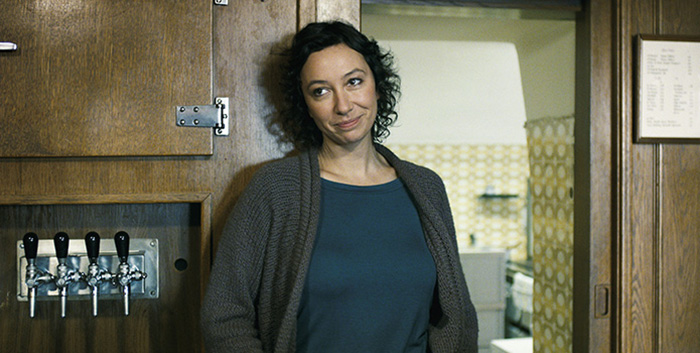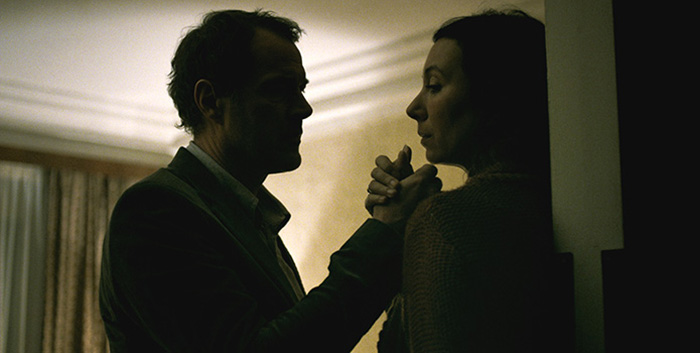The image of a drowning fish—gasping and jumping atop a rock too far from salvation—is what has stuck with me most after watching writer/director Götz Spielmann’s new dramatic study of two sisters worlds apart in life and the dying father binding them together. Each character is like that fish, struggling to stay relevant within disparate identities none can truly admit are bringing happiness. They seek solace in that which they cannot have, going through the motions of existences teetering towards futility. The sisters’ transgressions begin leaving their marks on fragile psyches and defeated attitudes as their father discovers a newfound clarity when his end nears. Oktober November [October November] shows us their rebirth as the months change, revealing secrets and airing frustrations to finally free themselves from the self-imposed prisons of unfulfilling lives.

It’s a film that possesses little dramatic action beyond revelations from the past—many of which don’t even find full transparency by its conclusion. We as an audience learn every little secret kept while the characters themselves are only told the ones that concern them on a level deeper than gossip. It isn’t about some grand cathartic blow-up of familial tensions and pent-up jealousies. None of that would do anything but drive a wedge deeper into their middle, fracturing the already slim connection into an irreparable feud of ego and petty assumptions. Sonja (Nora von Waldstätten) and Verena (Ursula Strauss) work better with distance like any siblings would and while they are able to rally around their father (Peter Simonischek) at his time of need, the covetous nature of what the other has is always bubbling under the surface.
Introduced in dueling vignettes of individual lives before converging at the old, barely-used Austrian Alps hotel their parents built into a thriving business decades previous, we catch a glimpse of the isolating and empty feelings these women find themselves trying to escape any chance they get. Sonja is a prominent actress living in Berlin who involuntarily spices in comments about her celebrity and fame during conversation because subconsciously those are all she has. Reduced to tears more often than not with the unsavory situations she puts herself in—whether an affair with a married man or a steady stream of two-dimensional roles taken to increase her exposure, stay busy, and find willing participants from the actors pool for sexual trysts—she is and always will be an outsider detached from the loving inclusion Verena found in marriage.

What she doesn’t know is that her older sister’s life is anything but perfect. While Verena’s affable husband Michael (Johannes Zeiler) and son Hannes (Andreas Ressl) may be her public persona, the passion she stifled when deciding to move into the hotel to care for her ailing father is only rekindled in the arms of his doctor, Andreas (Sebastian Koch). Like her mother before her, she has embraced the life of a woman giving her soul to those around her rather than taking what would inspire her to feel more than mere unspoken gratitude. She resents Sonja for leaving—a fact made obvious when the actress enters the kitchen after helping some guests by declaring how accomplished she felt working with her hands—while wrestling with the guilt of wishing she had done the same.
Spielmann and cinematographer Martin Gschlacht masterfully capture these defeated women with a clinical precision as they go about their day-to-day. We watch Sonja at work, performing a scene with great emotional distress in a naturally flowing single take pan that reveals the set and its crew hanging on every word. We see how her expression and demeanor while the camera rolls is almost identical to that of her true self; the Sonja always being told she looks unhappy. And on the flipside, we catch Verena in the kitchen cooking or at her father’s bedside reminding the surly old man to take his pills. There is a sense she’s going through motions she’s repeated every day for years, the entrance of Michael or Hannes just two more pieces inside a system of normalcy that’s consumed her.

Genuine joy finds Sonja in her return home and the memories of being part of something that meant more than a paycheck and idolatry. For Verena it’s the understanding and compassionate embrace of Andreas, a place she can escape the person she didn’t have a choice becoming. The declining health of their father therefore finds a way to open their eyes to second chances by putting a face to their own mortality and affording the opportunity to be free from the women they believe they must remain. He only understands his role after a heart attack gives proof of an afterlife and release from the constant disappointment and pain of life. Changing him indelibly, the scare opens him up to explaining one more hidden truth. One expressing just how like her mother each daughter is.
October November is at its best when allowing itself to exit the nuanced, realistic drama the majority is packaged within. This goes back to the image of that fish I spoke of before—a sort of prescient visual marker for Sonja when her father takes a turn for the worse—as well to describe an arresting scene shot from above Simonischek’s unconscious body as though through his eyes floating above in an otherworldly fashion. These flourishes never appear out-of-place, however, fitting in naturally with the authentic character study on display. They’re additional tools von Waldstätten and Strauss can work off of to add to the bottomless depth their emotionally wrought sisters possess. While it’s ultimately unknown whether these two months will lead them to restart their lives, they certainly showed the power to change is always possible.
October November plays TIFF on Sunday, September 8th; Monday, September 9th; and Saturday, September 14th. Watch the trailer above and see our complete coverage below.


